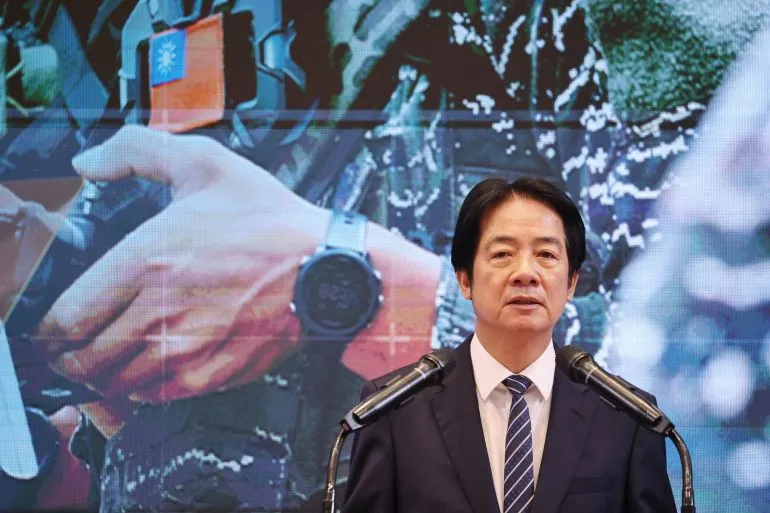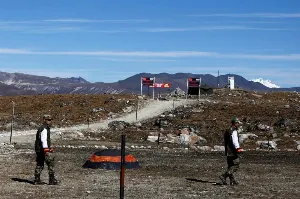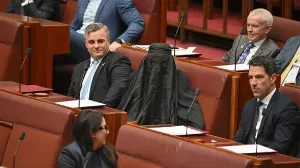Taiwan Announces $40 Billion Defence Budget Amid Rising Tensions with China

Taiwan's President Lai Ching-te has announced a significant increase in the island's defence budget, amounting to $40 billion over the next eight years, as tensions with China escalate. This announcement reflects Taiwan's commitment to enhancing its military capabilities in response to perceived threats from Beijing.
In a statement made on Wednesday, President Lai asserted that there is "no room for compromise on national security". He emphasised the necessity of strengthening Taiwan's defences, particularly in collaboration with support from the United States. Lai stated, "This is not an ideological struggle, nor a ‘unification vs independence’ debate, but a struggle to defend ‘democratic Taiwan’ and refuse to submit to being ‘China’s Taiwan’.”
The announcement follows a recent meeting of Taiwan's National Security Council, where officials revealed the increased budget would be at least $8 billion higher than previously anticipated. President Lai pointed out that Chinese military harassment, along with espionage and propaganda efforts, have intensified, prompting the need for a robust military response.
Lai expressed concern that the greatest threat to Taiwan is not necessarily a military invasion from China but the potential for Taiwan to surrender its sovereignty. He highlighted historical lessons, stating, "History has proven that compromising with aggression only brings war and enslavement." He categorically dismissed Beijing’s proposal for a governance model similar to that of Hong Kong, labelling it an "inviolable red line for Taiwanese society".
The additional budget will cover the years 2026 to 2033 and aims to incorporate advanced technology, including artificial intelligence tools, new missile systems, and drone capabilities. Defence Minister Wellington Koo noted that the funds would also facilitate improvements in military procurement processes, as several substantial orders from the United States have experienced delays. Furthermore, the government plans to establish measures to protect Taiwanese citizens from Chinese transnational repression.
This increase in defence spending is projected to raise Taiwan's military expenditure to 3.3% of its GDP by 2026, with a target of reaching 5% by 2030. Raymond Greene, the representative of the United States at the American Institute in Taiwan, welcomed the budget announcement, calling it a crucial step towards maintaining peace and stability in the Taiwan Strait by enhancing deterrence.
The budget announcement comes in the wake of a phone conversation between former United States President Donald Trump and Chinese President Xi Jinping, during which Xi reiterated China's claim over Taiwan and its intentions to reclaim the territory. Xi described Taiwan's reunification with China as an "integral part of the post-war international order".
The situation is further complicated by ongoing tensions between China and Japan, particularly after Japanese Prime Minister Sanae Takaichi indicated that Japan might militarily intervene if China were to attack Taiwan. In response, China has enacted a series of economic sanctions against Japan.
Shinjiro Koizumi, Japan’s Defence Minister, recently visited Yonaguni Island, the closest Japanese territory to Taiwan, affirming that preparations for deploying medium-range missiles were progressing "steadily". This move has drawn sharp criticism from Beijing, which accused Japan of exacerbating regional tensions. A spokesperson for China’s Taiwan Affairs Office, Peng Qingen, stated that Taiwan was wasting resources to gain favour with foreign powers.
As Taiwan moves forward with its defence strategy, it faces challenges in securing parliamentary approval for the proposed budget. The opposition, led by the Kuomintang party, which favours closer ties with China, holds significant influence over the legislative process. Recently elected Kuomintang chairperson Cheng Li-wun has expressed opposition to the increased defence expenditure, arguing that Taiwan's financial resources are limited.
In summary, Taiwan's declaration of a $40 billion defence budget highlights the island's determination to bolster its military capabilities in the face of rising threats from China. The government aims to establish a stronger deterrent while navigating complex geopolitical dynamics in the region.

Fire Tragedy in Hong Kong: Thirteen Confirmed Dead in High-Rise Blaze

India Criticises China's Actions Amid Arunachal Pradesh Dispute

Australian Senator Faces Suspension Over Burka Protest in Parliament

Israel Launches Air Strike in Beirut Targeting Hezbollah Leader





